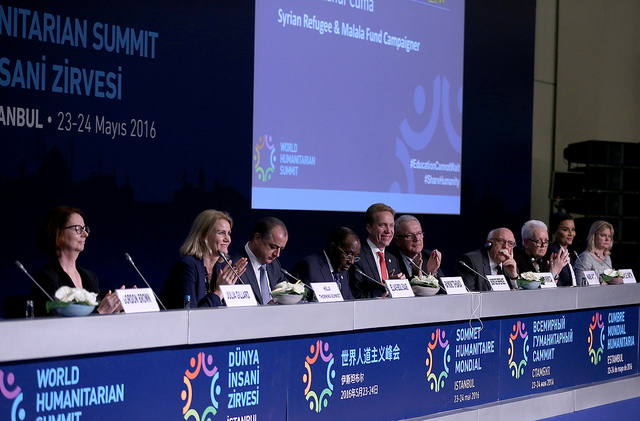At World Humanitarian Summit, World Leaders Agree: Education Cannot Wait

Photo courtesy of World Humanitarian Summit.
In reaction to figures revealing that emergencies jeopardize the education of a staggering 75-million children, the international community gathered at the first-ever World Humanitarian Summit in Istanbul where they agreed on one thing: Education cannot wait.
During a Summit Special Session chaired by UN Special Envoy for Global Education and Chair of the International Commission on Financing Global Education Opportunity, Gordon Brown, the Education Cannot Wait fund for education and emergencies was launched. The official launch comes along with GBC-Education’s announcement of mobilizing $100 million from business to support the fund.
“This is the right initiative at the right time. We must step up our efforts to deliver quality education to children and youth in conflict zones and crises,” said Norwegian Minister of Foreign Affairs Mr. Borge Brende. “We cannot afford a future with millions of children without education.”
The official launch of the fund, which aims to provide 13.6 million children and youth living in emergencies and protracted crises with quality education over the course of the next five years, is the culmination of months of campaigning and planning with advocacy from all sectors, including business.
“The launch of the fund is a landmark moment as we continue with our commitment to get every child into school and learning,” said GBC-Education Executive Chair Sarah Brown, noting this important milestone for children in crisis. “Now we have a dedicated, accountable fund where donations can be directed. We hope this will lead to increased private sector investment and new innovative partnerships to bring education to all.”
Coinciding with the fund’s launch, Dubai Cares, the European Union, Netherlands, Norway, the UK Department for International Development, and the United States Government made commitments totalling $90 million, or a little over half of the total commitments needed for year one. The appeal for the first year’s worth of funding will culminate at the UN General Assembly in September.
“Children don’t need education even in emergencies; they need education especially in emergencies,” said UNICEF Executive Director Anthony Lake. “Without an education, how will they gain the knowledge and skills to chart their own futures — and to someday lend their hands to building more peaceful, stable futures for their societies? And how can we hope to reach out global development goals for education if we don’t focus on children trapped in humanitarian emergencies — who represent almost half of all children out of school today?”
Despite the rising number of out-of-school children around the world and the unprecedented incidences of humanitarian conflicts and disasters, humanitarian aid for education has nearly halved in the same period, leaving an annual funding shortfall of $9 billion. Ultimately the fund will seek to bridge access to quality education for 75 million children and youth by 2030.
